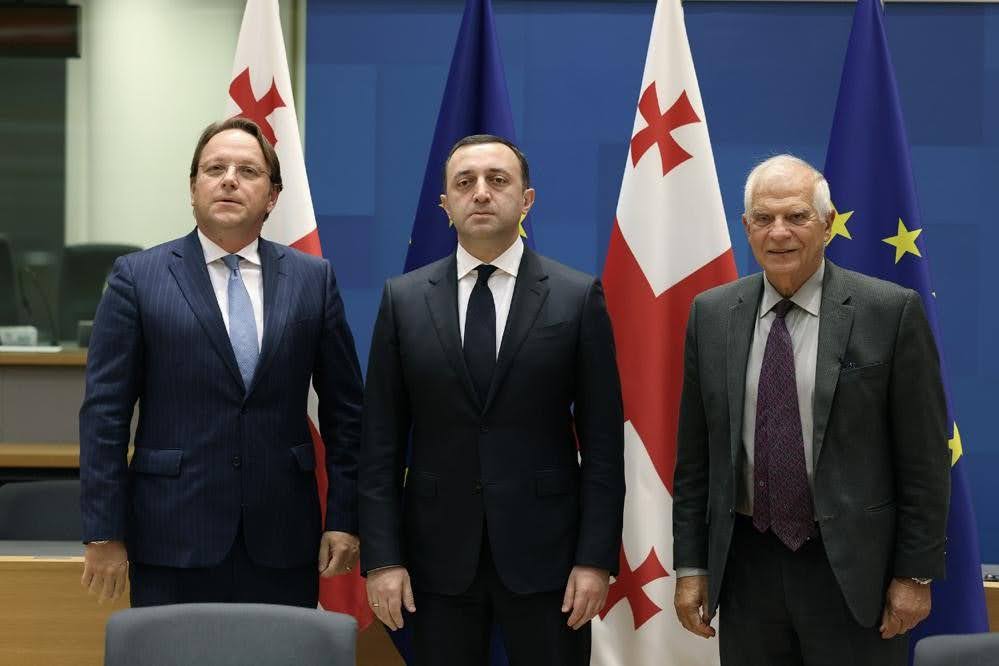
The Georgian Parliament has overruled President Salome Zurabishvili’s veto of a controversial surveillance bill. The changes will give Georgia’s investigative agencies broader powers and fewer constraints.
This arrives against a backdrop of a number of uninvestigated wiretapping scandals and strong calls from the EU for better oversight of law enforcement bodies.
On 6 September, the Georgian Parliament overruled President Salome Zurabishvili’s veto against a controversial surveillance amendments package, adopting it on the first day of the fall session.
The package law was initially passed on 7 June. It substantially extended time limitations on how long someone can be under covert surveillance for, and expanded the list of criminal offences meriting covert investigative operations. The changes prompted both local and international criticism.
[Read more on OC Media: Georgian Dream pushes ahead with invasive new surveillance bill]
On 22 June Georgian President Salome Zurabishvili returned the bill to Parliament by using her veto powers for the first time during her tenure.
Zurabishvili reiterated her opposition to the bill on 1 September, six days before the Georgian Dream parliamentary majority mobilised votes to overturn it.
‘We are all well aware that we live in a country where every one of us, when we enter a space and want to talk, thinks, “should I keep my phone on or leave it outside?”… This is not a European life, this is not in line with securing human rights’, Zurabishvili warned during her press conference.
Despite calling her predecessor Giorgi Margvelashvili a ‘vetoer’ and vowing not to follow his lead on several occasions, Zurabishvili admitted there was a need to address changes that she described as ‘going against the European way of life’.
Zurabishvili’s veto was struck down the same day Georgian PM Irakli Gharibashvili departed for Brussels to discuss Georgia’s progress on implementing institutional reforms as a major precondition for an EU membership bid.

‘Guaranteeing accountability and oversight of law enforcement agencies’ was among the major blocks of recommendations the European Commission gave to Georgia on 17 June, and a factor in the EU’s subsequent decision not to grant the country EU membership candidate status.
‘Lowering the standard of human rights protection‘
A day after the Georgian Parliament overruled Zurabishvili’s veto, the US Embassy in Georgia criticised the Parliament for ‘intentionally pass[ing] wiretapping legislation that expands the government’s ability to monitor its citizens’.
The Embassy’s statement on to say that the amendments ‘do not comply with European standards’ and are ‘against clear recommendations of the Venice Commission and Western Partners’.
‘This late moves Georgia away from European integration, not towards it’, the statement concluded.
On 9 June, 10 major watchdog groups, including Transparency International Georgia and Open Society Georgia Foundation, appealed to President Zurabishvili to veto the bill, warning that the new rules would ‘notably lower the standard of human rights protection in the process of covert investigative actions’.
The groups found ‘most disturbing’ the amendments allowing covert eavesdropping in investigating 77 types of crime and freeing the authorities from notifying a wiretapped individual for an indefinite period of time. They warned that the bill would roll back all the progressive reforms implemented in 2014 in this area.
Opposition to the bill has focused on Georgia’s poor record of investigating illegal wiretapping cases, and has been bolstered by a harsh assessment published by the Venice Commission.
[Read about the latest alleged illegal wiretapping case on OC Media: Leaked recording suggests surveillance of Georgian newsroom]
The Venice Commission, a Council of Europe-based legal advisory body formally called the European Commission for Democracy Through Law, delivered their ‘Urgent Opinion’ on 26 August.
The document, produced following Zurabishvili’s request for it upon exercising her veto, goes as far as suggesting ‘a comprehensive revision of the covert surveillance systems’ in Georgia.
According to the Commission, the surveillance bill’s Explanatory Note did not ‘sufficiently explain the necessity of the specific amendments on covert investigative measures in the current Georgian context’.
It went on to note that there was no justification for the suggested changes, given ‘doubts as to the efficiency of judicial control… allegations of unlawful mass surveillance and leaks of personal data, as well as the insufficient oversight and complaints mechanism’.
The Venice Commission also criticised the bill as rushed and adopted in a non-inclusive manner, after Georgian lawmakers skipped consultations with stakeholders and constitutional bodies including the Georgian Public Defender and the Personal Data Protection Service.
Significant local and international criticism did not spare Zurabishvili’s parliamentary secretary Giorgi Mskhiladze from being scolded on 6 September by majority members for allegedly not offering credible legal arguments against the amendments.
The day after the Opinion was published, one of the leading Georgian Dream lawmakers, the First Deputy Chairperson Giorgi Volski insisted that the report was bereft of any ‘actual, substantial’ legal argument. Volski suggested that the Venice Commission revisit their document.









